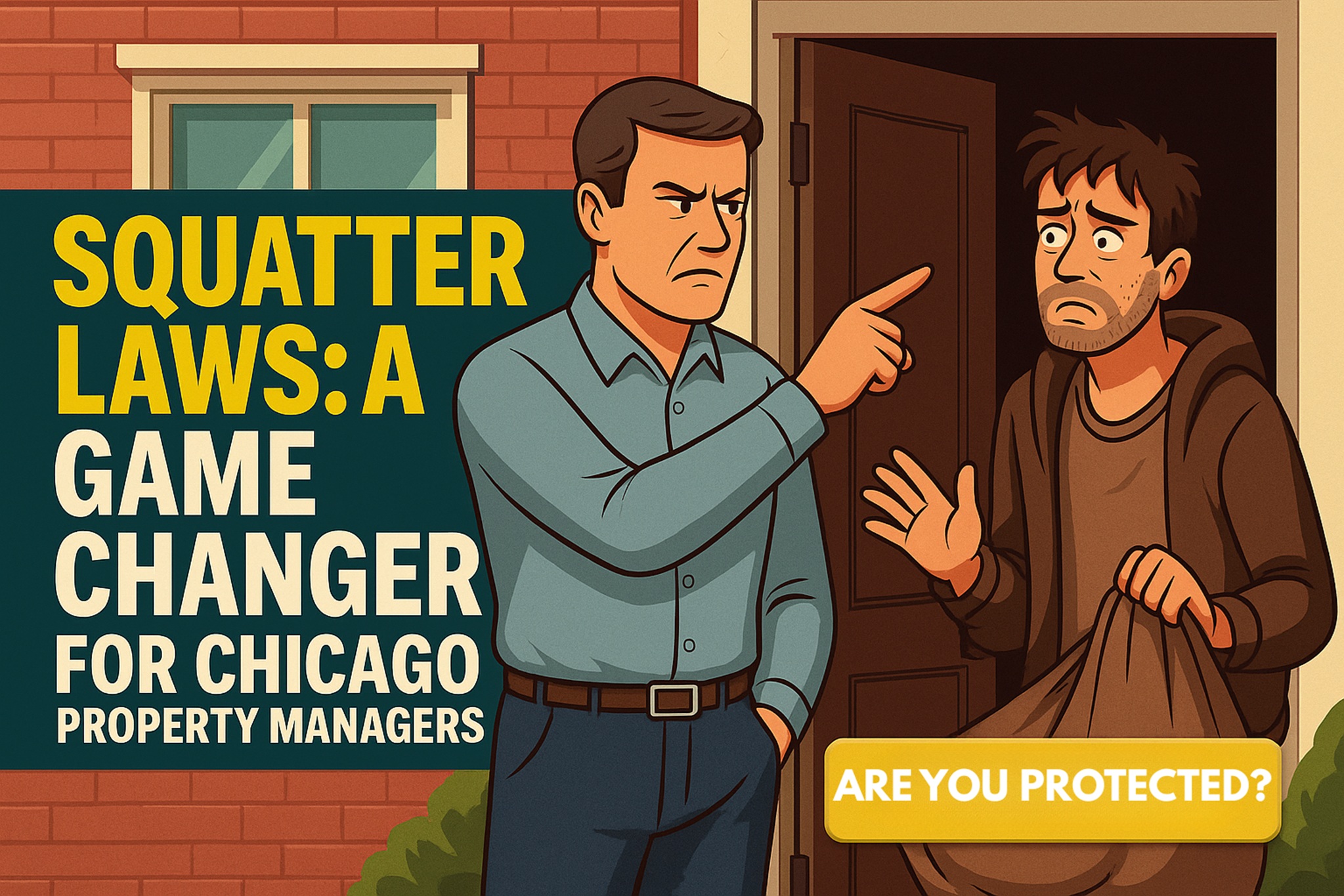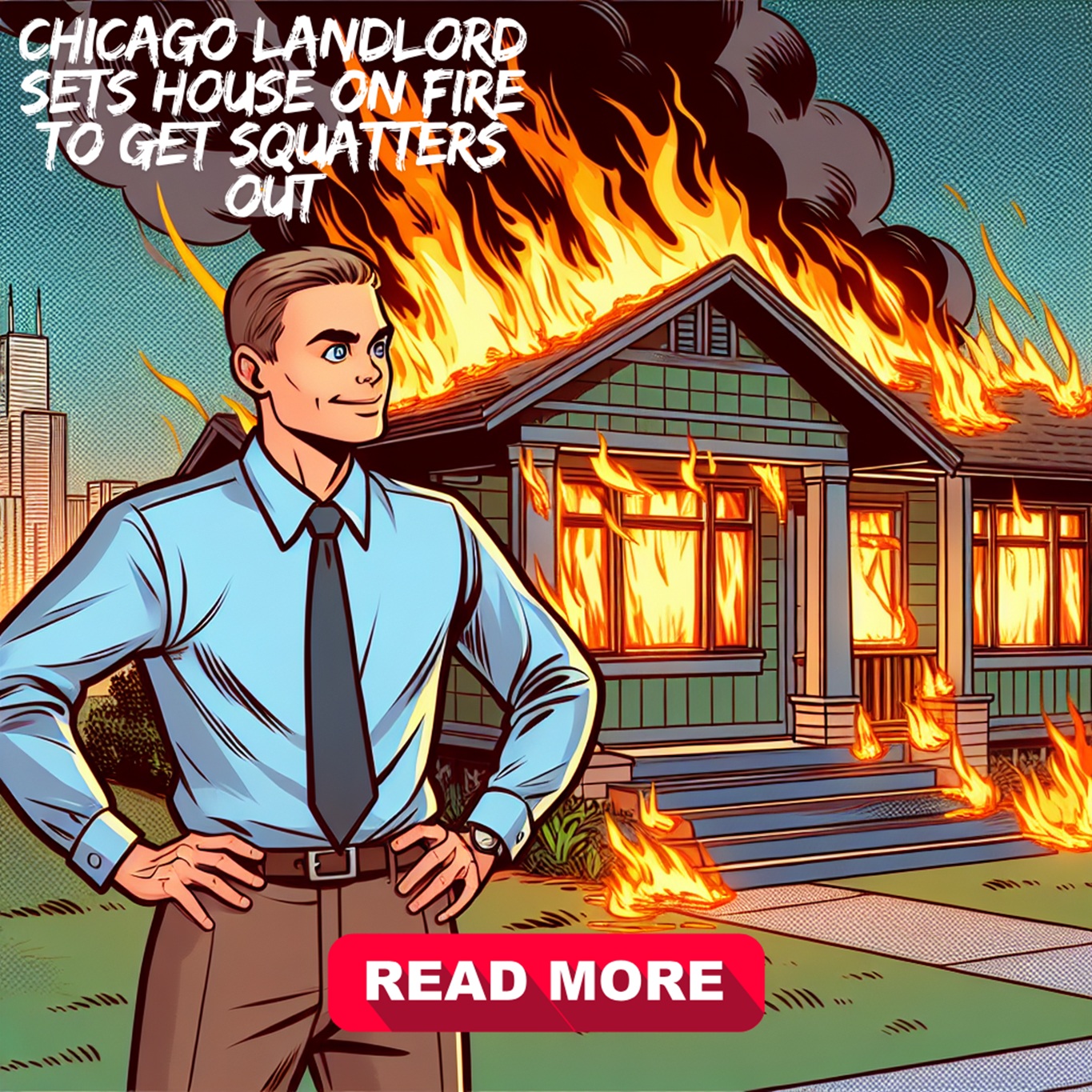
Author: Mark Ainely | Partner GC Realty & Development & Co-Host Straight Up Chicago Investor Podcast
The Problem Chicago Landlords Face Today
Picture yourself showing up at your vacant Chicago rental to show a prospective tenant the place to lease. When you go to put your key in the lock at the front door for some reason it doesn't go in the slot or it goes in and doesn't turn? You ask yourself “what in the … I was just here 2 days ago, I know this key works!”
Then you walk around back, and you notice garbage outside the cans and maybe even a patio set in the back yard? No, this is not a scary movie, it’s a nightmare. You try your key on the side door and you realize..this isnt even the same lock.
Then down the driveway an extremely large man comes walking out saying “what are you doing here and why are you trying to break in my house”.
You make the claim…”this is my house and I didn't rent it to you” and he says back “I signed a lease, paid the rent, and was given keys by the owner so I have the right to be here.”
Then you do what anyone would do….CALL THE CHICAGO POLICE! They can help! They show up 15 minutes later and in that time you are thinking this is silly and I will solve this in a few minutes once the police arrive, but that isn’t where this is going.
When the police arrive they go to the door and talk with this occupant and the occupant pulls out an executed lease and shows proof he paid rent.
The police officer walks back to you and says “I am sorry there is nothing more we can do, this is a civil matter”.
Your next step is to go online or call your attorney and before you know it you are posting notice, filing for an eviction, and waiting through the process for 6 months to get your place back.
Have you heard horror stories like this? Probably because this has been happening more and more to Chicago Landlords these last few years but the Illinois Government has stepped up and done something about it!
Why Squatter Laws Matter for Every Chicago Property Manager
In Illinois, managing rental property is no walk in the park. From navigating the Chicago Residential Landlord and Tenant Ordinance (CRLTO), keeping updated on the Cook County Residential Tenant Landlord Ordinance(RTLO), to keeping up with seasonal market shifts and property maintenance, property managers and landlords already have their hands full. Add in squatters—individuals who take up residence without permission—and you’ve got a serious threat to both cash flow and property rights.
The risk and frustration of squatters can sometimes push landlords to the edge. Our eye-opening article, Chicago Landlord Sets House on Fire to Get Squatters Out, explores a tragic (and illegal) example of what happens when the system fails to protect property owners. It’s a wake-up call for lawmakers and investors alike.
What Is A Squatter
In Illinois, a squatter is someone who takes up residence in a property without any legal right—no lease, no agreement with the owner, nothing. They’re basically just living there without permission. And the tricky part is, if you don’t act fast or don’t follow the right legal steps, the situation can escalate. You can’t just show up and kick them out. Illinois law has protections in place that, if you’re not careful, can actually start to work in the squatter’s favor—especially if they’ve been there a certain amount of time or if you’ve unknowingly allowed them to stay without formally evicting them. That’s where things get messy.
That’s why all eyes in the Illinois rental market are currently on Senate Bill 1563, a bill recently passed by the Illinois legislature that could dramatically shift how law enforcement and property managers deal with squatters. The bill is now awaiting the signature of Governor J.B. Pritzker and he is expected to sign it.
When signed into law, this bill would make it easier for landlords to remove unauthorized occupants by classifying them as trespassers, cutting through the red tape of the traditional eviction process.
Here’s why this matters for Chicago property managers and real estate investors.
What Is Senate Bill 1563?
Senate Bill 1563, amends the Code of Civil Procedure in Illinois. For the sake of this article we will refer to it as the “Squatter Bill” which is what it is known as around Chicago landlord circles. The key points:
It clarifies that nothing in the Eviction Article should prohibit law enforcement from enforcing criminal trespass laws.
It allows law enforcement to remove people or property from a home or unit if the individual is unlawfully occupying it.
In short: if someone is living in your property without a legal lease or ownership interest, police can treat it as criminal trespass, not just a civil matter.
This is a huge win for Chicago landlords and property managers who have struggled with unauthorized occupancy.
Why This Change Is Critical in Chicago’s Rental Market
1. Squatter Loopholes Undermine Legal Property Ownership
As you can see from the scenario above, under current Illinois law, squatters often use legal gray areas to delay or avoid eviction. They claim tenant status, which forces landlords to pursue a full eviction process, even if no lease ever existed.
That means:
Long court wait times
Legal fees
Missed rental income
Delays in renovations or re-listing the unit
2. Police Are Currently Handcuffed
Chicago Police often won’t remove squatters because the situation is treated as civil rather than criminal. That leaves property owners in limbo, watching their asset deteriorate while legal procedures drag on.
This “Squatter Bill” changes that dynamic by restoring the ability of police to treat unauthorized occupancy as a criminal matter, enabling faster action.
How This Impacts Chicago Property Managers Directly
As a Chicago property manager, here’s what you can expect when this Squatter Bill is signed into law:
1. Faster Turnovers and Reduced Vacancy Loss
You’ll spend less time stuck in eviction court, and more time getting the unit back on the market. That’s a big win for owners and tenants waiting for housing.
Check our Vacancy Loss Calculator.
2. Stronger Tools for Managing Risk
You’ll gain an additional legal avenue to deal with unauthorized occupants. This adds more structure and safety to property management processes.
3. Better Investor Confidence
Many investors are currently scared off by Chicago’s tenant-friendly laws. A bill like this restores some balance and rebuilds confidence among property owners, especially smaller landlords who can’t absorb large losses. I have watched numerous Landlords give up and sell after an event like this happens to them.
4. Less Strain on Property Management Operations
When squatters take hold of a property, it doesn’t just cost money—it consumes your team’s time, attention, and energy. Maintenance requests, inspections, and other routine tasks fall by the wayside when a crisis like unauthorized occupancy takes over. With clearer enforcement through this Squatter Bill, property managers can redirect their time back to proactive asset management.
5. Protecting Relationships With Neighbors
Let’s face it: squatters don’t just create headaches for property owners. They often cause problems for neighbors. We’ve heard complaints of noise disturbances, trash accumulation, vandalism, and even threats to safety. When managers can’t act quickly, neighbors lose patience—not just with the squatter, but with the property itself. That reputation damage can last long after the problem is removed.
More Real Scenarios: The Current Cost To Chicago Investors
We’ve seen firsthand how squatters cost landlords thousands of dollars. One GC Realty client had a unit in Logan Square tied up by someone who entered the property under the guise of being a "guest" of a former tenant. Because they had received mail and changed the locks, it took over 90 days to resolve the issue through eviction court. During that time, the owner lost nearly $6,500 in rental income—not to mention the legal fees and stress.
If this Squatter Bill had been law at that time, police could have intervened immediately.
These aren’t rare cases. In tight rental markets like Chicago, where demand is high and margins are narrow, even a one-month vacancy loss can be the difference between profit and loss.
The Legal Gray Area: Why Landlords Need Clarity
One of the biggest challenges with squatter situations is that they often fall into a legal gray area. Property managers frequently report:
Police refused to act because “it’s a civil matter”
Judges requiring a full eviction process, even when there’s no lease
Tenants claiming verbal agreements or presenting forged documents
This creates an environment where dishonest individuals can abuse the system, taking advantage of legal protections meant for legitimate tenants.
This Squatter Bill offers the clarity that landlords have been asking for. It draws a firm line between tenants and trespassers—making enforcement clear, simple, and swift.
A Boost for Neighborhoods and Housing Stability
This isn’t just a win for property owners—it’s a win for neighborhoods. Vacant properties tied up by squatters often become hotspots for criminal activities.
By allowing swift action, this Squatter Bill will help maintain housing quality, reduce crime, and support local stability.
It will also reduce insurance claims and liability for property owners who are currently forced to allow unauthorized individuals to occupy space, often with zero control over the damage being done.
What Chicago Property Managers Should Do Next
Squatter Bill hasn’t been signed yet, but it’s on the brink. Here’s what you should do as a property manager or Landlord in Chicago:
Stay informed: Follow updates on Squatter Bill and be ready to act quickly if it becomes law.
Document everything: If you suspect a squatter scoping out your house, or have reports by the neighbors, collect evidence. This will help you respond effectively once the law changes.
Educate your leasing agents: Let leasing agents know what this law means and how it benefits them but make sure they are still keeping security tight around keys and lockboxes. Share this blog as a resource.
Review your lease agreements: Make sure your documents have clear language around unauthorized occupancy and tenant rights.
Partner with a legal expert: Consider a consultation with a landlord-tenant attorney to align your property management process with upcoming changes.
Related Reading: Squatter Scams and Deed Fraud in Chicago
If this topic resonates with you, you’ll want to check out our in-depth blog: Chicago Landlord: Combat Squatter and Deed Fraud Scams. We break down how scam artists manipulate property title records and squat in vacant units without proper documentation—and how landlords can prevent it.
There is a lot of information contained here if you plan on investing in real estate locally. It may seem overwhelming for those wanting to invest in the Chicago market, but it is really just a team sport. Who is on your investing team? Do you even have a team? GC Realty & Development, LLC. has a dedicated team of professionals that are willing to share their decades of experience in all facets of real estate. We handle everything from Brokerage, Leasing and Property Management. Whether you hire us or not, we are happy to provide you with our resources and expertise.
What gets me up in the morning and keeps me going twelve hours a day is the ability to add value to local area investors, in Chicago and beyond! Those who connect with me often hear me say that our goal is to bring value to everyone we come in contact with. We hope that in return, they will one day hire us for our Tenant Placement,or Property Management Services, refer us to someone they know, or leave us a review about our services. We would clearly love all three, however, we are happy whenever we get the opportunity to help!
Reach out today!

Partner / Cohost of Straight Up Chicago Investor Podcast

 Vendor Portal
Vendor Portal


